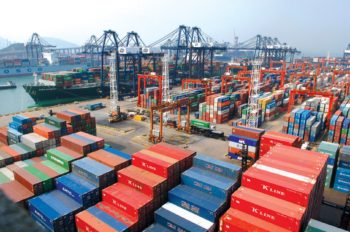A huge traffic jam of hundreds of ships carrying coal and iron ore into China has built up outside key ports like Tianjin and Caofeidian, just as winter demand hits its peak ahead of the Chinese New Year holiday later this month.
Major northern Chinese ports have suspended loading of ships several times since December 20 due to poor visibility largely caused by smog that has enveloped large parts of northern China at various times in recent weeks.
This has left hundreds of ships sitting in China’s Bohai Bay waiting to offload into key Chinese industrial hubs like Tianjin, which is close to Beijing.
An officer onboard the 119,503 deadweight tonne (DWT) Nord Vela, which anchored off Caofeidian on January 5, said when contacted by phone that the delays were the worst he had seen.
“Most of the time we can berth in one or two days. But we’ve been waiting four days already,” he said, opting not to give his name.
Other ships are similarly affected. The captain of the 93,258 DWT LM Selene said it has been waiting for seven days to berth at Tangshan, while crew on the 114,091 DWT Anangel Dawn said it had waited idly for five days near the Caofeidian anchorage before docking at Huanghua.
Shipping data from Thomson Reuters Eikon shows that more than 100 dry-bulk carriers, mostly carrying coal and iron ore for China’s power stations and steel mills, have been waiting to deliver into the ports of Tianjin and its nearby terminals at Caofeidian and Huanghua.
Including other northeast Chinese ports like Dalian, the number of dry-bulkers waiting to deliver rises to around 300 as power stations and steel mills take in orders to meet heating demand during the coldest time of the year. Many are also stocking up before most of China shuts down for the Chinese New Year holiday, which starts at the end of January.
Every extra day a 180,000 deadweight tonne capesize ship waits outside a northern Chinese port to unload its Australian iron ore cargo costs the charterer about $12,000 based on current freight rates, excluding costs for crew salaries and supplies as well as fuel.
The delayed deliveries are depleting available stocks of certain materials.
Total coal stocks at the ports of Tianjin, Caofeidian, Jingtang, and Qinhuangdao were 16.3 million tonnes at the beginning of this week, down more than 6 percent since last week, according to port operators and shipping sources.
Iron ore has been less affected due to plentiful stocks, traders said.
The congestion is also messing up schedules for shippers across the Asia Pacific region as vessels sit idle outside China’s ports for several days.
“Nominating vessels for subsequent shipments is becoming a little more difficult as we can’t be 100 percent sure if we are getting accurate information” about when ships will be available,” said Ralph Van Der Hoeven, head of Klaveness China, part of Norwegian dry bulk shipper Torvald Klaveness.
The delays, which mean it could be even weeks before ships are able to deliver their raw materials, are costing hundreds of thousands of dollars in extra shipping fees every day.
“On a few occasions (shippers) jumped into the market to fix prompt spot tonnage, at rates well above the market,” said Peter Lye, head of shipping at mining major Anglo American, referring to certain shippers who needed to charter at short notice to carry deliveries when other vessels were caught in China’s traffic jam.
The need by miners and operators to charter alternative ships at short notice helped fuel a 29.5 percent rise in capesize charter rates from Western Australia to northern China from a seven-week low of $4.93 per tonne on Dec. 15 to a five-week high of $6.37 a tonne in January.
